MI4SaferFOOD
Multispectral Imaging Application for Food Safety and Quality Evaluation
Overview
The Challenge
Users/Testers
• Lab testing: Conducted with 50 users, analysing 780 food images to refine AI accuracy.
• Industry demonstration: Over 200 stakeholders participated in testing at exhibitions.
• Consumer testing: More than 180 citizens actively tested the MI4SaferFOOD app.
The solution
The MI4SaferFOOD project integrates multispectral imaging, artificial intelligence (AI), and citizen engagement to enhance food safety and freshness evaluation. Its AI-powered image recognition system lets consumers and stakeholders assess food freshness via smartphone cameras, supporting sustainable food systems and FOODITY’s mission of advancing data sovereignty, citizen engagement, and food ethics.
Key features include:
• Real-time freshness scoring through a mobile app.
• Personalised consumption recommendations to reduce waste.
• Industry access to aggregated, anonymised datasets.
• DataU integration for secure, decentralised, GDPR-compliant data management.
Users/Testers
• Lab testing: Conducted with 50 users, analysing 780 food images to refine AI accuracy.
• Industry demonstration: Over 200 stakeholders participated in testing at exhibitions.
• Consumer testing: More than 180 citizens actively tested the MI4SaferFOOD app.
Members
Citizen Engagement
Citizen participation shaped MI4SaferFOOD from design to deployment.
- Co-design phase: 100+ citizens in workshops, surveys, and focus groups informed usability and food safety priorities.
- Prototype tests: Internal lab evaluations included 50 testers (analysing 780 food images) and 200+ industry stakeholders validated performance.
- Public trials: 180+ citizens conducted over 400 freshness scans, contributing anonymised data to refine AI accuracy.
- Feedback-driven improvements: Enhanced freshness scale, usability adjustments, and expanded food categories.
DataU and FOODITY components
DataU — FOODITY’s GDPR-compliant consent management platform — ensures citizens control how their food-related data is stored, shared, and used. Integrated with MI4SaferFOOD, it enables anonymous image contributions, improves AI models, and supports industry research via aggregated datasets.
Results and achievements
Tangible Improvements
The MI4SaferFOOD project has raised awareness about food freshness among consumers, with over 180 citizens actively participating in testing. This led to a greater understanding of food quality and waste reduction practices. Users reported more informed purchasing decisions, selecting fresher produce based on AI-powered freshness assessments. Additionally, citizen engagement with data sovereignty principles increased, as users became more aware of how their food-related data is used and managed.
Efficiency improvements have been equally transformative. The AI-powered food freshness evaluation system has significantly enhanced food recognition accuracy, achieving 96.2% for lettuce and 94.8% for apples. Additionally, transitioning to Azure Image AI optimised response times, making freshness assessments more efficient. Businesses leveraging FOODITY components reported better inventory management and reduced spoilage rates, further strengthening industry applications.
Data use has also improved with citizen-driven data sharing, as users contributed over 400 food scans, refining AI models for greater precision. Secure data management through DataU integration has reinforced transparency and decentralised storage, upholding FOODITY’s core data sovereignty principles. Meanwhile, industry collaboration has expanded access to aggregated, anonymised datasets, supporting better food safety protocols.
Beyond features and services, MI4SaferFOOD has generated valuable datasets, including a food freshness image database, which consists of a growing repository of multispectral food images used to refine AI accuracy. Consumer behaviour insights have been documented, offering data on food purchasing habits, freshness perception, and waste reduction trends. Furthermore, open-access food safety data is now available via the FOODITY DataLake (“Explore our data”) and Zenodo, supporting research and industry applications.
Output Produced
The MI4SaferFOOD project has delivered several key outputs, including innovative features, services, and datasets that enhance food safety, citizen engagement, and data sovereignty. Here’s an overview:
Features developed
- AI-powered freshness evaluation: Multispectral imaging and deep learning models for food freshness assessment.
- Mobile app integration: A user-friendly app allowing citizens to scan food items and receive real-time freshness scores.
- Personalised recommendations: AI-driven insights on optimal consumption windows and food waste reduction strategies.
Services launched
- Citizen engagement platform: Over 180 consumers actively tested the FOODITY app, contributing >400 food scans.
- Industry collaboration: Businesses accessed aggregated, anonymised datasets to improve food safety protocols.
- DataU integration: Secure, decentralised data storage ensuring data sovereignty and transparency.
Datasets generated
- Food freshness image database: A growing repository of multispectral food images used to refine AI accuracy.
- Consumer behaviour insights: Data on food purchasing habits, freshness perception, and waste reduction trends.
- Open-access food safety data: Available via DataU and the Foodity Database, supporting research and industry applications.
Impact Indicators
MI4SaferFOOD has fostered active participation from consumers, ensuring a data-driven and user-centric approach to food freshness evaluation. Over 180 citizens have actively engaged in testing the MI4SaferFOOD app, conducting more than 400 food scans to assess produce freshness. High repeat usage rates highlight the growing reliance on AI-powered freshness assessments, with positive user feedback emphasising the app’s ease of use and accuracy.
Beyond engagement, MI4SaferFOOD has driven notable behavioural changes. Consumers have significantly shifted their purchasing decisions, favouring fresher produce based on AI evaluations. Increased awareness of food freshness indicators has led to better storage practices, reducing unnecessary food waste. Additionally, citizens have become more conscious of data sovereignty, with many actively contributing anonymised food images to refine AI models while maintaining control over their personal data.
Feedback from Users
Users who participated in the MI4SaferFOOD piloting activities provided valuable feedback, shaping the refinement and improvement of the solution. Here are some key insights:
- Ease of use: Most users found the mobile app intuitive, with a straightforward scanning process for food freshness evaluation.
- Response time: Some testers suggested faster AI processing, leading to optimisations in Azure Image AI integration.
- Freshness assessment: Users appreciated the high accuracy rates (e.g., 96.2% for lettuce, 94.8% for apples).
- Edge cases: Some participants noted challenges with certain food textures, prompting refinements in multispectral imaging models.
- Food waste reduction: Many users reported more informed purchasing decisions, leading to less food waste.
- Data awareness: Increased understanding of data sovereignty, with users actively contributing anonymised food scans.
Suggested improvements
- Expanded food categories: Requests for additional food items (e.g., bananas, dragon fruit).
- Enhanced freshness scale: Some users wanted more detailed freshness indicators beyond the current scoring system.
Social/environmental/economic impact
The MI4SaferFOOD project:
- Empowers citizens to control personal food data and make informed choices; fosters cooperation between consumers, researchers, and industry.
- Reduces food waste, supports sustainable consumption, advances circular economy principles.
- Strengthens Europe’s food innovation ecosystem, drives growth in sustainable product offerings, and enhances competitiveness.
Materials and links
Updates
ALIGNMENT WITH FOODITY
The MI4SaferFOOD solution is designed to seamlessly integrate with FOODITY’s core principles.
MI4SaferFOOD prioritises user autonomy by leveraging DataU. Citizens maintain full decision-making power over data accessibility, ensuring privacy and ethical use. Furthermore, strict adherence to GDPR regulations reinforces the data sovereignty framework, guaranteeing transparency and trust in all data exchanges.
A co-design approach was implemented to foster active citizen involvement, leading to over 180 participants engaging in design workshops, prototype testing, and feedback sessions. This user-centric model ensures that the AI-powered freshness assessment tool reflects real-world needs. Citizens contributed over 400 food scans, playing a crucial role in refining the AI accuracy of freshness evaluations. Additionally, MI4SaferFOOD promotes consumer education, empowering individuals to make informed and responsible food choices.
By integrating AI-powered freshness evaluations, MI4SaferFOOD directly supports food waste reduction, helping consumers optimise their food consumption and minimise waste. The project promotes sustainable food choices, influencing market trends toward healthier andMI4SaferFOODMI4SaferFOODs to utilise MI4SaferFOOD’s data-driven insights to enhance food safety and inventory management strategies, ensuring a more sustainable supply chain.
MI4SaferFOOD fosters an open-data ecosystem where citizens actively contribute anonymised food freshness data, refining AI models while maintaining data privacy.
LESSONS AND RECOMMENDATIONS
For organisations and innovators looking to replicate or scale MI4SaferFOOD-inspired solutions in food & nutrition, while ensuring data sovereignty and ethical AI use, here are key recommendations:
Data sovereignty & ethical AI
- Use decentralised, GDPR-compliant data management.
- Provide opt-in anonymous data sharing.
Citizen co-design
- Involve end-users early and continuously in solution development.
- Use real-world feedback to evolve AI models and usability.
Scalable, modular systems
- Ensure AI can accommodate new food categories.
- Use cloud-based, open-access data resources.
Industry collaboration
- Facilitate API integration for businesses.
- Share best practices via events and publications.
- Educate consumers to sustain behavioural change.
Main benefit of participating in the FOODITY Programme
By participating in FOODITY, MI4SaferFOOD innovators gained funding, technical expertise, ethical data management, and industry connections, ensuring long-term impact in food and nutrition systems.










